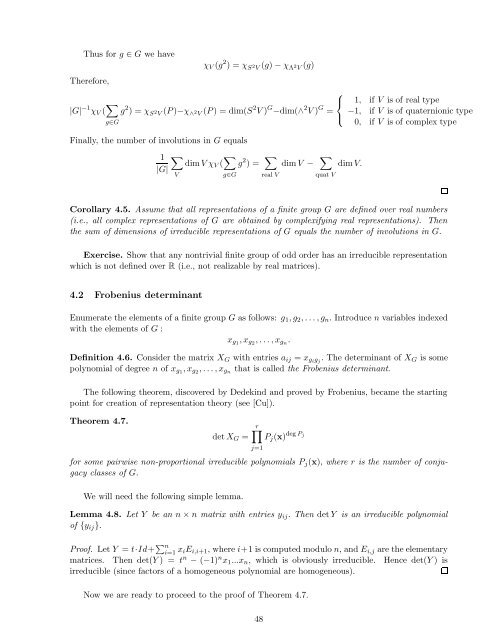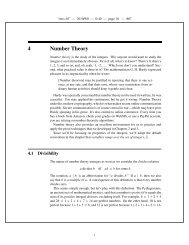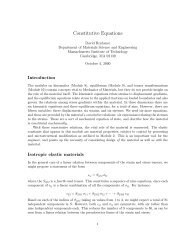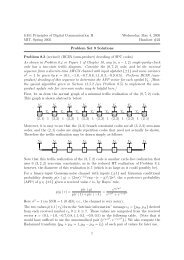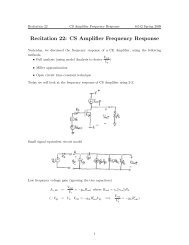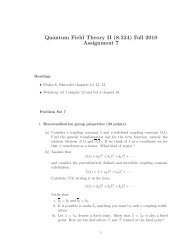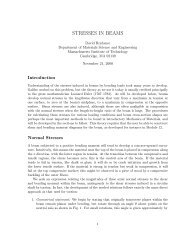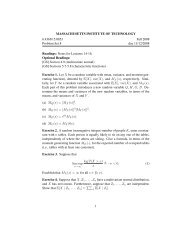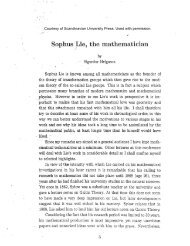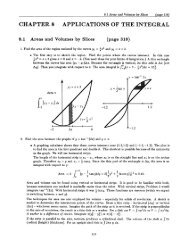Lecture notes for Introduction to Representation Theory
Lecture notes for Introduction to Representation Theory
Lecture notes for Introduction to Representation Theory
You also want an ePaper? Increase the reach of your titles
YUMPU automatically turns print PDFs into web optimized ePapers that Google loves.
Thus <strong>for</strong> g G we have<br />
ν V (g 2 ) = ν S 2 V (g) − ν 2 V (g)<br />
There<strong>for</strong>e,<br />
⎞<br />
⎟ 1, if V is of real type<br />
| G| −1 ν 2 V ) G<br />
V ( g 2 ) = ν S 2 V (P )−ν √ 2 V (P ) = dim(S 2 V ) G −dim(√ = −1, if V is of quaternionic type<br />
⎠<br />
gG<br />
0, if V is of complex type<br />
Finally, the number of involutions in G equals<br />
1 <br />
<br />
dim V ν V ( g 2 ) = dim V − dim V.<br />
|G|<br />
V<br />
gG real V quat V<br />
Corollary 4.5. Assume that all representations of a finite group G are defined over real numbers<br />
(i.e., all complex representations of G are obtained by complexifying real representations). Then<br />
the sum of dimensions of irreducible representations of G equals the number of involutions in G.<br />
Exercise. Show that any nontrivial finite group of odd order has an irreducible representation<br />
which is not defined over R (i.e., not realizable by real matrices).<br />
4.2 Frobenius determinant<br />
Enumerate the elements of a finite group G as follows: g 1 , g 2 , . . . , g n . Introduce n variables indexed<br />
with the elements of G :<br />
x g1 , x g2 , . . . , x gn .<br />
Definition 4.6. Consider the matrix X G with entries a ij = x gi g j<br />
. The determinant of X G is some<br />
polynomial of degree n of x g1 , x g2 , . . . , x gn that is called the Frobenius determinant.<br />
The following theorem, discovered by Dedekind and proved by Frobenius, became the starting<br />
point <strong>for</strong> creation of representation theory (see [Cu]).<br />
Theorem 4.7.<br />
<br />
r<br />
P j (x) deg P j<br />
det X G =<br />
j=1<br />
<strong>for</strong> some pairwise non-proportional irreducible polynomials P j (x), where r is the number of conjugacy<br />
classes of G.<br />
We will need the following simple lemma.<br />
Lemma 4.8. Let Y be an n × n matrix with entries y ij . Then det Y is an irreducible polynomial<br />
of {y ij }.<br />
n<br />
Proof. Let Y = t·<br />
Id+ ⎨ i=1 x iE i,i+1 , where i+1 is computed modulo n, and E i,j are the elementary<br />
matrices. Then det(Y ) = t n − (−1) n x 1 ...x n , which is obviously irreducible. Hence det(Y ) is<br />
irreducible (since fac<strong>to</strong>rs of a homogeneous polynomial are homogeneous).<br />
Now we are ready <strong>to</strong> proceed <strong>to</strong> the proof of Theorem 4.7.<br />
48


